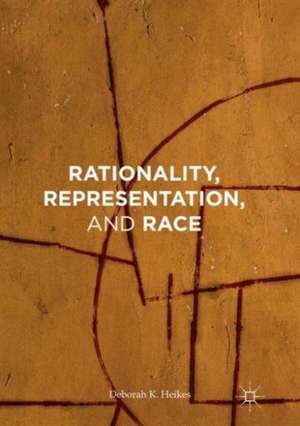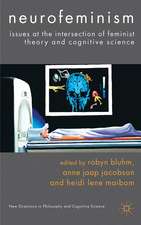Rationality, Representation, and Race
Autor Deborah K Heikesen Limba Engleză Hardback – 12 mai 2016
Preț: 338.31 lei
Nou
Puncte Express: 507
Preț estimativ în valută:
64.76€ • 70.36$ • 54.43£
64.76€ • 70.36$ • 54.43£
Carte tipărită la comandă
Livrare economică 17-23 aprilie
Preluare comenzi: 021 569.72.76
Specificații
ISBN-13: 9781137591708
ISBN-10: 1137591706
Pagini: 254
Ilustrații: XII, 262 p.
Dimensiuni: 148 x 210 x 21 mm
Greutate: 0.47 kg
Ediția:1st ed. 2016
Editura: Palgrave Macmillan UK
Colecția Palgrave Macmillan
Locul publicării:London, United Kingdom
ISBN-10: 1137591706
Pagini: 254
Ilustrații: XII, 262 p.
Dimensiuni: 148 x 210 x 21 mm
Greutate: 0.47 kg
Ediția:1st ed. 2016
Editura: Palgrave Macmillan UK
Colecția Palgrave Macmillan
Locul publicării:London, United Kingdom
Cuprins
Preface
1. What's the Problem?
2. Representation and Racism
3. Philosophy's Outward Turn
4. The Origin of Mind
5. The Promise of Virtue
References
Index
1. What's the Problem?
2. Representation and Racism
3. Philosophy's Outward Turn
4. The Origin of Mind
5. The Promise of Virtue
References
Index
Notă biografică
Deborah Heikes is Professor and Chair of Philosophy at the University of Alabama in Huntsville. She is the author of Rationality and Feminist Philosophy and The Virtue of Feminist Rationality.
Textul de pe ultima copertă
During the Enlightenment, rationality becomes not a property belonging to all humans but something that one must achieve. This transformation has the effect of excluding non-whites and non-males from the domain of reason. Heikes seeks to uncover the source of this exclusion, which she argues stems from the threat of subjectivism inherent in modern thinking. As an alternative, she considers post-Cartesian reactions of modern representationalism as well as ancient Greek understandings of mind as simply one part of a functionally diverse soul. In the end, she maintains that treating rationality as an evolutionarily situated virtue concept allows for an understanding of rationality that recognizes diversity and that grounds substantive moral concepts.












